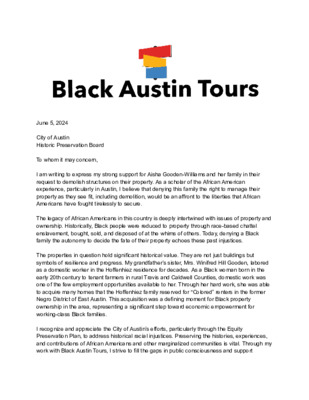19.1 - 1702 & 1704 E Martin Luther King Jr Blvd - support letter — original pdf
Backup

June 5, 2024 City of Austin Historic Preservation Board To whom it may concern, I am writing to express my strong support for Aisha Gooden-Williams and her family in their request to demolish structures on their property. As a scholar of the African American experience, particularly in Austin, I believe that denying this family the right to manage their property as they see fit, including demolition, would be an affront to the liberties that African Americans have fought tirelessly to secure. The legacy of African Americans in this country is deeply intertwined with issues of property and ownership. Historically, Black people were reduced to property through race-based chattel enslavement, bought, sold, and disposed of at the whims of others. Today, denying a Black family the autonomy to decide the fate of their property echoes these past injustices. The properties in question hold significant historical value. They are not just buildings but symbols of resilience and progress. My grandfather’s sister, Mrs. Winifred Hill Gooden, labored as a domestic worker in the Hoffenhiez residence for decades. As a Black woman born in the early 20th century to tenant farmers in rural Travis and Caldwell Counties, domestic work was one of the few employment opportunities available to her. Through her hard work, she was able to acquire many homes that the Hoffenhiez family reserved for “Colored” renters in the former Negro District of East Austin. This acquisition was a defining moment for Black property ownership in the area, representing a significant step toward economic empowerment for working-class Black families. I recognize and appreciate the City of Austin’s efforts, particularly through the Equity Preservation Plan, to address historical racial injustices. Preserving the histories, experiences, and contributions of African Americans and other marginalized communities is vital. Through my work with Black Austin Tours, I strive to fill the gaps in public consciousness and support programmatic efforts to this end. However, historic preservation should not solely focus on “preserving” the past. It must also consider financial and generational wealth. Equitable historic preservation involves educating and directing resources to historically excluded communities, empowering them to make decisions about their properties. If the Gooden family chooses to demolish a property to benefit from community development, they should be able to do so without impediment. The City of Austin should support their efforts to continue their family’s legacy of property ownership and economic progress. Moreover, this situation presents a unique opportunity for the City of Austin to collaborate in telling the stories connected to these properties. The focus should not solely be on the Hoffenhiez family but also on Mrs. Gooden, who cared for their family, inherited the properties, endured institutional disinvestment in East Austin, and strives to maintain property ownership in a rapidly changing environment. By including the Gooden family in the interpretation of these historic elements, we honor their contributions and support their ongoing legacy. In closing, I urge the City of Austin to support the Gooden family’s request to demolish their property. This action will not only honor their historical and economic legacy but also benefit the citizens of Austin by preserving the true essence of our community’s diverse history. Sincerely, Javier L. Wallace, Ph.D. Founder & Scholar Black Austin Tours +1 512-517-2597